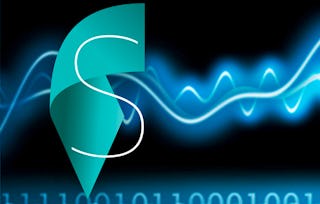Digital Signal Processing is the branch of engineering that, in the space of just a few decades, has enabled unprecedented levels of interpersonal communication and of on-demand entertainment. By reworking the principles of electronics, telecommunication and computer science into a unifying paradigm, DSP is a the heart of the digital revolution that brought us CDs, DVDs, MP3 players, mobile phones and countless other devices.

Digital Signal Processing 1: Basic Concepts and Algorithms

Digital Signal Processing 1: Basic Concepts and Algorithms
This course is part of Digital Signal Processing Specialization


Instructors: Paolo Prandoni
Access provided by FutureX
60,115 already enrolled
639 reviews
What you'll learn
The nature of discrete-time signals
Discrete-time signals are vectors in a vector space
Discrete-time signals can be analyzed in the frequency domain via the Fourier transform
Skills you'll gain
Details to know

Add to your LinkedIn profile
4 assignments
See how employees at top companies are mastering in-demand skills

Build your subject-matter expertise
- Learn new concepts from industry experts
- Gain a foundational understanding of a subject or tool
- Develop job-relevant skills with hands-on projects
- Earn a shareable career certificate

There are 4 modules in this course
Introduction to the notation and basics of Digital Signal Processing
What's included
6 videos7 readings1 assignment2 ungraded labs1 plugin
Modeling signals as vectors in an appropriate vector space. Using linear algebra to express signal manipulations.
What's included
7 videos6 readings1 assignment1 ungraded lab1 plugin
The fundamental concepts behind the Fourier transform and the frequency domain
What's included
14 videos10 readings1 assignment3 ungraded labs1 plugin
Delving deeper in the world of Fourier analysis.
What's included
11 videos9 readings1 assignment2 ungraded labs1 plugin
Earn a career certificate
Add this credential to your LinkedIn profile, resume, or CV. Share it on social media and in your performance review.
Instructors

Offered by
Why people choose Coursera for their career

Felipe M.

Jennifer J.

Larry W.

Chaitanya A.
Learner reviews
- 5 stars
69.32%
- 4 stars
20.50%
- 3 stars
5.63%
- 2 stars
1.72%
- 1 star
2.81%
Showing 3 of 639
Reviewed on Jul 21, 2020
very good course, but it require some math and a brief reading of a book in signals, there are only few courses in coursera that are challenging, this is one of them, 10/10
Reviewed on Jul 15, 2020
It is a really comprehensive course with quizzes that were a bit tricky and challenging. I liked the python notebooks for complementing the theory of the course
Reviewed on Feb 4, 2025
Really interesting and well explained. Loved the extra resources and the "Signal of the Day" segment.
Explore more from Physical Science and Engineering

École Polytechnique Fédérale de Lausanne

École Polytechnique Fédérale de Lausanne

École Polytechnique Fédérale de Lausanne

École Polytechnique Fédérale de Lausanne

